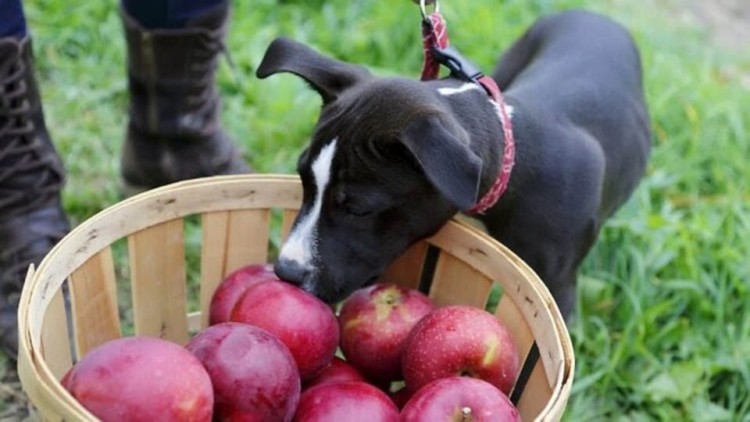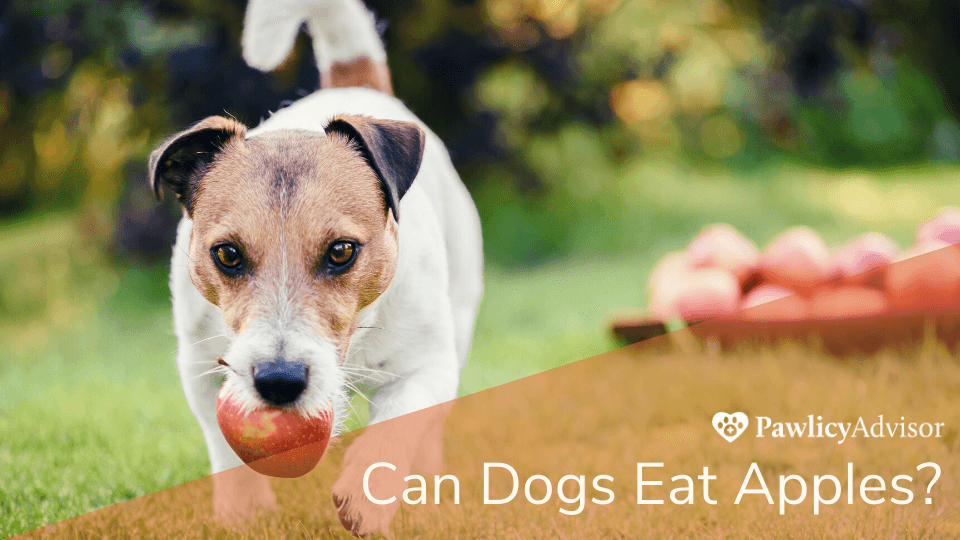We all know that apples are good for humans, but can dogs eat them? The answer is yes, these fruits are packed with nutrients that can be very beneficial to your pet’s health. However, there are certain precautions you need to take before serving them to your furry companion.
Read on to learn about the different ways your pooch can eat apples and what to avoid.
- Are apples good for dogs?
- What parts of an apple can dogs not eat?
- How many apples can my dog have?
- What if my dog has food allergies?
- How to serve your dog apples
- Key Takeaways
Pro Tip: Dogs can be guilty of chewing, eating, and swallowing stuff they absolutely shouldn’t, causing their owners lots of headaches! Getting pet insurance can ensure that you can protect and care for your furry family member in case of accidents and unpredictable illnesses by being reimbursed for up to 90% of veterinary bills.
Are apples good for dogs?
Many pups love apples, which is a good thing since these sweet and crispy fruits are rich in essential vitamins and minerals. When fed in moderation, the nutrients in apples can be very beneficial to your pooch. Here are some of the most important benefits of apples for dogs:
Apples contain high levels of dietary fiber which helps promote gastrointestinal health. A medium-sized apple provides about 4g of soluble and insoluble fiber. The soluble fiber facilitates water absorption at the same time slowing down the absorption of sugar into the bloodstream, whereas the insoluble fiber helps prevent constipation.
Apples also contain vitamin C which helps boost your dog’s immune system and prevents them from getting sick.
These crispy fruits contain a number of powerful antioxidants that reduce inflammation and combat harmful free-radicals linked to chronic diseases.
Apples also contain malic acid, which helps keep your pet’s teeth clean and breath fresh. If you’re concerned about the levels of sugar found in apples, don’t be. Apples also have a high water content, which will help carry away the sugar from the apple into the stomach as your pup eats it. The apple skin is an added bonus, providing mechanical cleaning to your dogs teeth, sort of like a toothbrush.
Finally, apples are low in calories (one small apple contains about 50 calories), low in protein, and low in fat, which makes them an especially good snack for senior pups.
Besides the above-mentioned nutrients, apples also contain potassium, calcium, as well as vitamins A and K. They’re also loaded with carbohydrates, which are an excellent source of energy.
 Image source: American Kennel Club
Image source: American Kennel Club
What parts of an apple can dogs *not* eat?
Before adding apples to your pup’s diet, make sure to speak with your vet to find out whether apples are safe for your pup as an individual, and how you should prepare them.
If fed improperly, these sweet fruits can actually be quite dangerous. For instance, if your furry pal is diabetic, they should stay away from apples as a single one contains about 25g of sugar.
Here’s what you need to pay attention to when it comes to serving your pooch apples.
Apple seeds
Apple seeds contain trace amounts of cyanide (as do peach pits, pear seeds, and almonds) which is released when they're broken or chewed. When giving apple slices to your four-legged friend, make sure to remove all the seeds. In addition, if you have apple trees in the garden or backyard, keep an eye on fallen fruits. You never know what your canine companion will eat or gnaw on. Luckily enough, the cyanide levels are relatively low and won’t pose significant danger after a single apple, but it can become a health concern if many apples-worth of seeds are consumed or the poison accumulates over longer periods of exposure.
Apple skin
One of the most frequent questions pup owners ask is Can dogs eat apples with skin? The answer is yes, but in moderate amounts. The skin is the primary source of antioxidants and fiber. However, too much of it can result in indigestion. So, if your pooch has a sensitive system, peel the apple to cut down on extra fiber.
Apple cores
The core, like the seeds, is a part of the apple you want to skip. The core is firm and quite difficult for most pups to chew, so it might present a choking hazard. Also, if swallowed, it could lead to a gastrointestinal blockage. If your pup has eaten an apple core before you had a chance to intervene but doesn't appear to be having any trouble, there's no reason to worry immediately - just keep an eye on them. However, if they start choking, try to gently remove the core with your fingers. Additionally, vomiting, diarrhea, painful abdomen, depression, or lethargy may be signs that the apple core is obstructing your pets stomach or intestines, and you should consult with your veterinarian immediately.
How many apples can my dog have?
As with any fruit, you should feed apples in moderation. Eating too many apples can result in diarrhea and stomach upset. Moreover, apples contain high amounts of sugar, which can cause problems for pups who suffer from diabetes or cancer. A slice or two of an apple makes a good serving for your furry friend because treats of any kind should only make up 10% of your pup’s daily caloric intake.
What if my dog has food allergies?
There is some risk that your canine companion might be allergic to apples. In rare cases, allergic reactions can lead to anaphylaxis, a potentially fatal condition. If you notice signs of an allergic reaction in your pup, including sneezing, coughing, difficulty breathing, swelling of the tongue or face, or hives, stop giving them apples and contact your vet right away.
A pet insurance plan can help cover the cost of allergy tests and treatment, in addition to helping you afford vet care for a number of other pet health issues.
Which types of apples are best for dogs?
Basically, all apple varieties commonly found at your neighborhood grocery store are safe for pups to eat. Canines seem to prefer the sweeter varieties—from the goldens or reds like Fuji, Gala, and Honeycrisp to the green or more tart varieties like Gravenstein or Granny Smith.
Whenever possible, choose organic apples, as many fruits you find in the supermarket contain pesticides, herbicides, as well as substances that make them shinier.
Avoid apple-flavored products or products that contain apples because they often contain chemicals, artificial flavors, added sugars, and artificial sweeteners like xylitol which can be toxic for dogs. This includes foods made from apples like applesauce, apple juice, and apple chips, which are not only less nutritious but also may be more problematic for your dog’s teeth and digestive system. These foods also have added sugar and contain no fiber and on top of that, specifically apple chips which are dehydrated.
 Image source: Rover
Image source: Rover
How to serve apples for your dog
Always speak to your vet before sharing any human foods with your dog. Some pups have medical conditions that might be worsened by eating apples.
If your vet says it’s okay to give your pooch apples, be sure to wash the fruit, remove the stem, core, and seeds, and cut it into slices.
Here are some serving ideas to make it easier for you to include apples in your pet’s diet:
- Freeze them and serve as a cool summer treat
- Mix them in with your pup’s food
- Use them to prepare a homemade, sugar-free applesauce
- Freeze applesauce in ice cube trays for a refreshing summer snack
- Make apple pops with Greek yogurt and applesauce
- Blend them with other dog-safe fruits like bananas and blueberries to make a smoothie
Key Takeaways
- When served in moderation, dogs can safely enjoy apples
- It's always best to consult with your vet first, especially if your four-legged companion has any medical condition.
- Be sure that the core and seeds are removed, and keep an eye on your pet whenever you’re introducing a new food.
